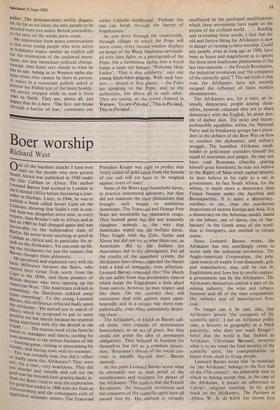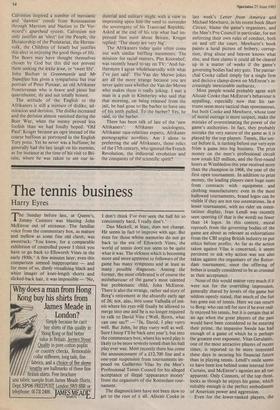Boer worship
Richard West
One of the harshest attacks I have ever
read on the people who now govern South Africa was published in 1930 under the title Caliban in Africa. The author
i Leonard Barnes had worked in London in the Colonial Office before becoming a jour- nalist in Durban. Later, in 1944, he was to Publish a book called Soviet Light on the Colonies, showing that Stalin's rule in cen- tral Asia was altogether more wise, in every respect, than Britain's rule in Africa; and as late as 1969 he had changed again and was favourable to the independent state of Biafra. He never wrote anything as good as Caliban in Africa and in particular his at- tack on the Afrikaners. Yet one ends up lik- ing the Afrikaners for just the reasons that Barnes thought them abhorrent.
He perceived and explained very well the basic difference between the Boers, who started their Great Trek north from the Cape in the 1830s, and those pioneers of British descent who were opening up the American West. 'The Americans trekked to son, th:
--eunn8; the Dutchmen trekked away from something'. To the young Leonard Barnes, this difference reflected badly upon the Afrikaner. 'He moved not in search of liberty which he proposed to put to some Positive use but merely because he resented being interfered with (by the British in the ,Cape) • • . The routine work of the farm he leaves to managers and slaves, turning his °Ain attention to the serious business of life hunting game, visiting or entertaining his riends, and having rows with his enemies'. This was certainly true, but did it reflect s° badly upon the Afrikaners? They were not, for a start, very avaricious. They did not murder and swindle and rob for the gold that lay beneath their grazing lands; in- eed the Boers tried to stop the exploration for gold that ended in 1886 with the finds at Johannesburg and the consequent rush of aggressive uittander miners. The Transvaal
President Kruger was right to predict that `every ounce of gold taken from the bowels of our soil will yet have to be weighed against rivers of tears'.
Some of the Boers kept household slaves,• in practice indentured labourers, but they did not maintain the slave plantations that brought such wealth to ambitious Americans. The Transvaal and Orange Free State are unsuitable for plantation crops. They hunted game but did not wantonly slaughter animals in the way that Americans wiped out the buffalo herds. They fought with the Zulu, Sotho and Xhosa but did not try to wipe them out, as Americans did to the Indians (or Australians did to the Aborigines). For all the cruelty of the apartheid system, the Afrikaners have always regarded the blacks with a kind of sympathy, even affection. Leonard Barnes conceded this:`The Dutch do not suffer from that involuntary reserve which keeps the Englishmen a little aloof from natives, however he may respect and like them. On the contrary they will sometimes deal with natives more open- heartedly and in a certain way more sym- pathetically, even when consciously despis- ing them'.
The Afrikaners, or Dutch as Barnes call- ed them, were capable of spontaneous benevolence, as an act of grace, but they could not grasp the idea of permanent obligations. They believed in freedom for themselves but not as a common posses- sion. 'Rousseau's theory of the social con- tract is equally beyond him', Barnes sneered.
At this point Leonard Barnes wrote what he obviously saw as final proof of the worthlessness and unfitness for power of the Afrikaner: 'The truth is that the French Revolution, the industrial revolution and the conquests of the scientific spirit have all passed him by. His outlook is virtually unaffected by the profound modifications which these movements have made on the psyche of the civilised world . . Reading and re-reading those words, I find that my old and furtive liking for Afrikaners is now in danger of turning to hero worship. Could any people, even as long ago as 1930, have been so brave and magnificent as to ignore the three most loathsome phenomena of the last two centuries — the French Revolution, the industrial revolution and 'the conquests of the scientific spirit'? The sad truth is that even the Afrikaners have not entirely escaped the influence of these modern abominations.
The Afrikaners are, for a start, an in- tensely democratic people among them- selves, however reluctant they are to share democracy with the English, let alone peo- ple of darker skin. The noisy and incom- prehensible squabbles within the National Party and its breakaway groups have prece- dent in the debates of the Boer War on how to conduct the diplomatic and military struggle. The humblest Afrikaner small- holder or gold-miner considers himself the equal of statesmen and judges. He may not have read Rousseau (thereby sparing himself great boredom); he may not believe in the Rights of Man (with capital letters); he does believe in his right to a say in government. In fact South Africa, for the whites, is much more a democracy than France became under the Jacobins and Buonapartists. It is more a democracy, needless to say, than the murderous despotisms of eastern Europe and Asia. It is a democracy on the Athenian model, based on the labour, not of slaves, but of 'bar- barians' in the Greek sense of the word: that is foreigners, not entitled to citizen status.
Since Leonard Barnes wrote, the Afrikaner has not unwillingly come to terms with the industrial revolution. The Anglo-American Corporation, the prin cipal source of wealth from diamonds, gale and manufacture, may still be run b! Englishmen and Jews but its profits suppor a government run by the Afrikaners. Thi Afrikaners themselves control a part of the mining industry, the wine and tobacco business and all of the state corporation; like railways and oil manufacture from coal.
No longer can it be said, alas, that Afrikaners ignore 'the conquests of the scientific spirit'. I met an Afrikaner politi- cian, a lecturer in geography at a black university, who does not teach Kruger's belief that the world is flat. Indeed an Afrikaner, Christiaan Barnard, invented what is to my mind the final atrocity of the scientific spirit, the transplantation of hearts from dead to living people.
Leonard Barnes wrote that 'in essentials he [the Afrikaner] belongs to the first halt of the 17th century'. An admirable time to which to belong except that, in the case of the Afrikaner, it means an adherence to Calvin's religious teaching. In his great book on the Afrikaners, The Puritans in Africa, W. A. de Klerk has shown how
Calvinism inspired a number of messianic and 'clawnise creeds from Rousseauism through Marxism and Nazism to Dr Ver- woerd's apartheid system. Calvinism not only justifies an 'elect' (or the People, the Dictatorship of the Proletariat, the Herren- yolk, the Children of Israel) but justifies this elect in enjoying the good things of life. The Boers may have thought themselves chosen by God but this did not prevent them seeking the lekke lewe, or 'sweet life'. John Buchan in Greenmantle and Mr Standfast has given a sympathetic but true portrait of Peter Pienaar, an old Afrikaner frontiersman who is brave and pious but quarrelsome, sly and not totally honest.
The attitude of the English to the Afrikaners is still a mixture of dislike, ad- miration and derision. The dislike increased and the derision almost vanished during the Boer War, when the enemy proved less foolish than we had fondly hoped. 'Old Paul' Kruger became an ogre instead of the coarse buffoon as portrayed in the English Tory press. Yet he never was a buffoon; he generally had the last laugh on his enemies, as for instance at the time of his visit to Bri- tain, where he was taken to see our in- dustrial and military might with a view to impressing upon him the need to surrender the sovereignty of his Transvaal Republic. Asked at the end of his trip what had im- pressed him most about Britain, Kruger replied: 'The sheep are very big'.
The Afrikaners today quite often come out with similar baffling statements. The minister for racial matters, Piet Koornhof, was recently heard to say on TV: 'And fur- thermore I agree wholeheartedly with what I've just said'. The Van der Merwe jokes are all the more strange because you are never quite sure whether the Van der Merwe who makes them is really joking. I met a man in a pub in Kimberley who said that that morning, on being released from the jail, he had gone to the barber to have one of his teeth pulled. To the barber? Yes, he said, to the barber.
There has been talk of late of the 'new
Afrikaners': Afrikaner sociologists, Afrikaner race-relations experts, Afrikaner pornographic novelists. Am I alone in preferring the old Afrikaners, those relics of the 17th century, who ignored the French Revolution, the industrial revolution and the conquests of the scientific spirit?



















































 Previous page
Previous page